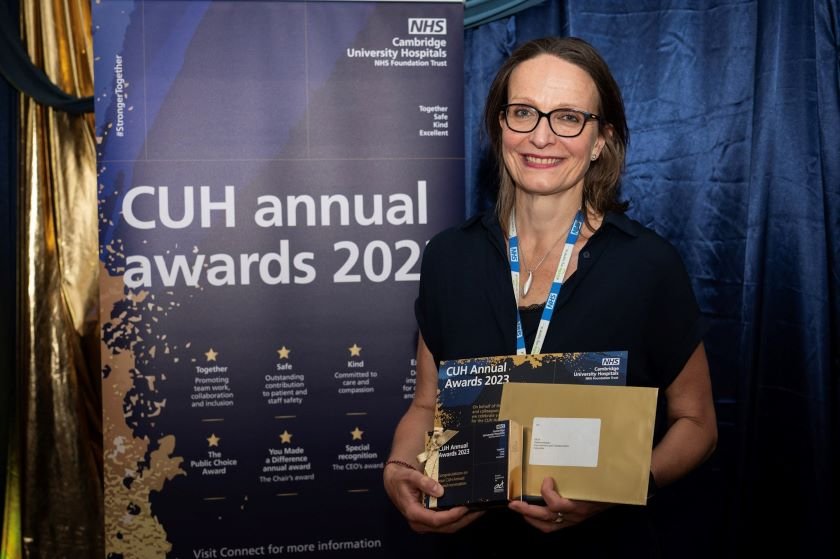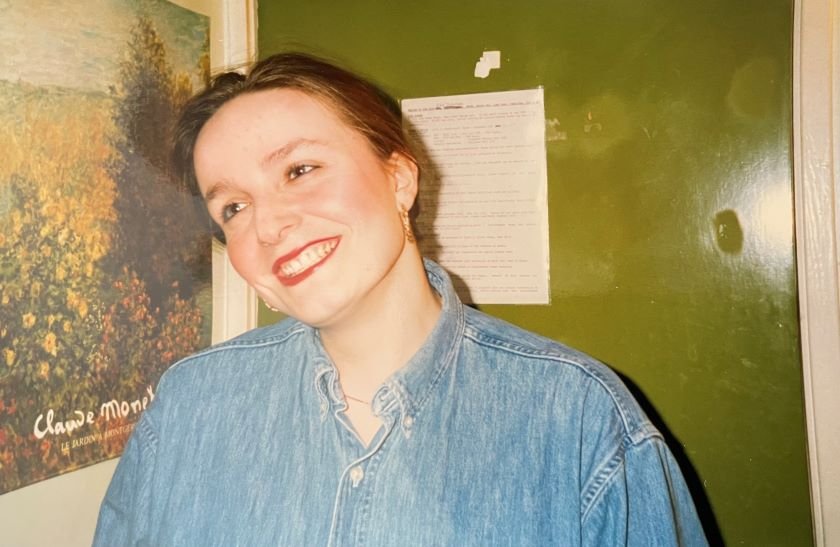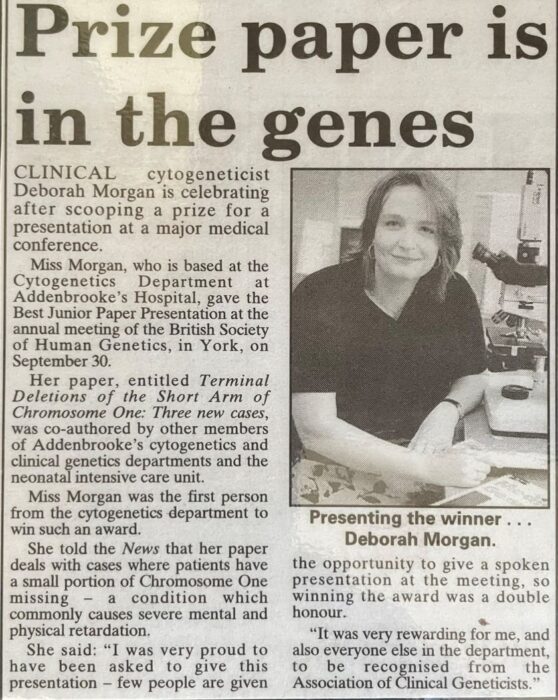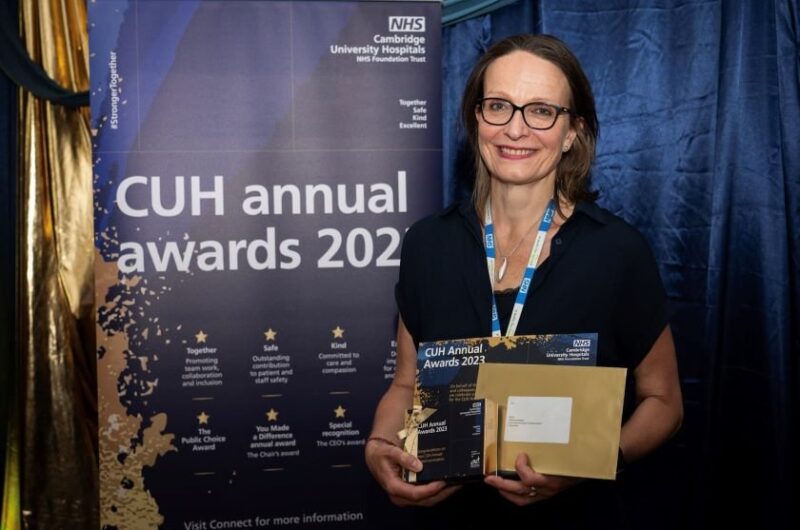Debbie Morgan is celebrating 30 years at Cambridge University Hospitals (CUH) after originally joining as a trainee clinical cytogeneticist in November 1993. Over the last 30 years Debbie has undertaken a range of senior leadership roles, including being involved with global health work with partners in low- and middle-income countries. Here, Debbie tells us more about this work and her time at CUH.

What is your name and your role in our hospitals?
Hi my name is Debbie Morgan and I am the Cambridge University Hospitals (CUH) Visiting Fellow in Global Health.
What do you enjoy most about your role?
Being able to work with so many incredible and inspiring colleagues from within CUH and with partner organisations locally, regionally and globally.
I enjoy supporting colleagues within CGHP to develop our collective vision for Cambridge Global Health and enabling colleagues within CUH and beyond to undertake global health work with partners in low- and middle-income countries (LMICs).
It is fantastic that CUH has invested in this role, as it highlights the importance the Trust places on global health.
I also enjoy working with and supporting colleagues to make improvements for patients, staff, the organisation and the wider health system, along with coaching and supporting colleagues to help them to grow and develop.
Tell us a bit about your CUH journey.
Following graduation from University College London (where I studied anatomy and developmental biology), I saw an advert for a trainee clinical cytogeneticist in the New Scientist and thought that it sounded like an incredibly interesting and rewarding role.
A clinical cytogeneticist is a diagnostic scientist who cultures cells from a person and uses various techniques to produce a karyotype, thereby visualising the person’s chromosomes to detect whether they are normal, or whether there are any possible abnormalities.
I subsequently wrote to a number of laboratories across Scotland and England (at the time my home was in Inverness) and was invited to attend an interview at Addenbrooke’s Hospital. It was quite scary at 22 years old being interviewed by a panel of four colleagues, including the professor of the department, Professor Malcolm Ferguson-Smith, but I was delighted to be offered a trainee position, made all the more special as the Trust was originally looking for a qualified clinical cytogeneticist.
Following my interview, I joined CUH on 22 November 1993 as a trainee clinical cytogeneticist and since then, all of my 30 year NHS career has been spent at CUH.
After eight and a half years as a clinical cytogeneticist I moved into a variety of management roles and have now been at director level for over 13 years.
I was previously an access, booking and choice programme manager, helping to negotiate patients’ appointments; the Choose and Book programme manager for our local health economy; head of corporate management; assistant director and then director of commissioning; commercial director for UnitingCare Partnership, which involved adults and older people’s community services; programme director working with colleagues regarding the move of Royal Papworth Hospital onto the Cambridge Biomedical Campus, to realise mutual benefits from improved patient pathways; and most recently, the director of service improvement and transformation.
Why you like working at CUH?
The diversity of our organisation in terms of our staff and the services we provide; being able to make a difference for our patients and colleagues, as well as patients and colleagues in LMICs where we support global health work.
It is a pleasure and privilege to work with so many wonderful colleagues, as well as having opportunities to undertake a variety of different, challenging and rewarding roles over my 30 years here.
What does a usual day look like for you?
Every day is different, which I love. My current role involves working with colleagues in CGHP, CUH and partner organisations, locally and globally, to support the development of our collective strategic vision for Cambridge Global Health, followed by its implementation.
There are huge opportunities for our clinical and non-clinical staff at CUH to undertake global health work, including our staff whose country of heritage is a LMIC; work with colleagues in our REACH Network will be hugely important to support this.
I am also the co-lead for an exciting global health project with colleagues in Kakamega, Kenya, which is about strengthening continuous quality improvement across the maternity and newborn care team in Kakamega County. A few weeks ago, I returned from a diagnostic visit to Kakamega with a junior doctor and the director from CGHP. It is an absolute joy and privilege to be working with the team; we have much to learn from LMICs, particularly as their resources are even more constrained than our own.
For me, this is my dream job and I feel incredibly blessed to be working with so many wonderful colleagues locally and globally to make a difference.

Tell us about a case study/experience at CUH that really stands out to you.
In 2008 I was very fortunate to receive a bursary from Addenbrooke’s Abroad (now CGHP) to undertake three weeks’ voluntary work at Bwindi Community Hospital in the middle of the Ugandan jungle. It was an incredible experience and opened my eyes as to how creative colleagues in LMICs need to be with their resources, but also how many of their strategic issues are very similar to ours; it also sparked my interest in global health work. I would highly recommend taking forward global health opportunities to anyone clinical, or non-clinical, as they are profoundly impactful in terms of your personal development, as well as the wider benefits and learning opportunities for our Trust and colleagues in LMICs. For anyone wanting to find out more, CGHP organises monthly drop-in sessions and is holding its 4th East of England Global Health Conference on Wednesday 27 November 2024.
How do you feel your role benefits our patients?
Building our vision for Cambridge Global Health, will enable even more of our staff, along with colleagues from partner organisations, to have the opportunity to undertake global health work, which benefits patients and colleagues in LMICs. Our staff gain important learning from colleagues in LMICs and are able to bring that back into CUH for the benefit of our patients, colleagues and Trust. I am still involved in delivering the Trust’s improvement coach programme, alongside other members of the Trust’s improvement and transformation team, along with quality improvement fundamentals/coach programmes in Kakamega, Kenya, which supports global health colleagues to make improvements for their patients, staff and the wider organisation.
In every role that I have undertaken, making a difference for our patients has been at the core.
What is the most notable thing that has changed at CUH in your time working here?
There have been so many changes since I started working for the Trust, but the most notable aspects include how much our hospital and the wider Biomedical Campus has grown; the number of staff who work for the Trust; that there is now a much greater focus on staff wellbeing, compassionate and inclusive leadership and equality, diversity and inclusion. We now have fantastic support and advice available through our staff Networks.
Personally, I am a member of the Purple Network, as 10 years ago I was diagnosed with a long term condition, that progressed from an undifferentiated connective tissue disorder onto lupus. Being able to support others with similar conditions, along with helping to raise awareness about disabilities/long term conditions/neurodiversity and what it is like to be a manager of others with such conditions is incredibly important to me.
Throughout my time at CUH, what hasn’t changed, however, is our desire to provide excellent, high quality and safe care for our patients.
What is the most notable thing that has changed in your profession/career in the years you’ve worked in the NHS?
How much innovation and technology has advanced and enabled us to deliver high quality care for our patients and make things more efficient and effective for one another. It’s remarkable to think that it wasn’t that long ago we had paper records and I can remember quirks with our old cytogenetics IT system, such as needing to press “shift tilde” to extend a line!

Return to news

